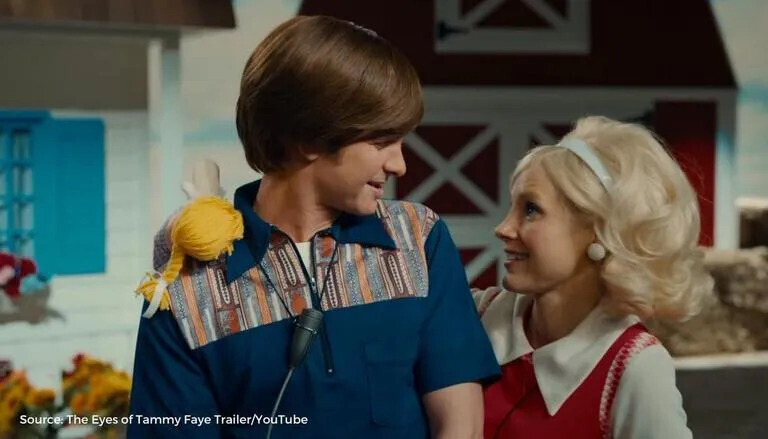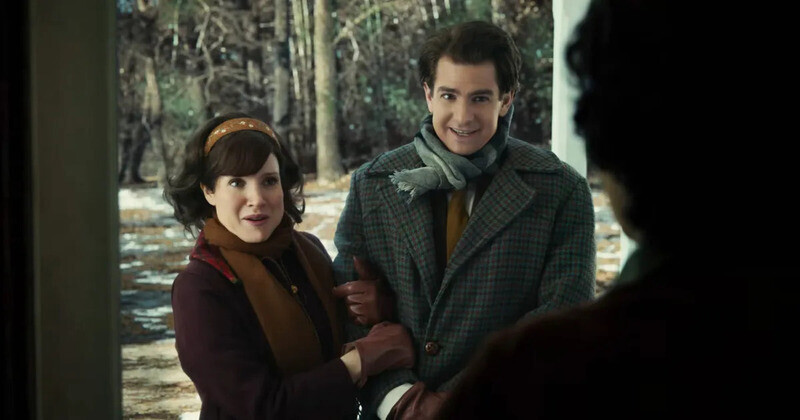
Near the beginning of "The Eyes of Tammy Faye," an off-camera make-up artist gently suggests that singer/puppeteer/televangelist Tammy Faye Bakker (Jessica Chastain) remove her iconic, one might even say garish, cosmetics. She wipes off her lipstick but the dark lip-liner remains. She explains that it is permanent. Like her eye-liner and eyebrows, it is tattooed on. Underneath the glitz and fakery is more glitz and fakery and it never comes off. Bakker and her husband Jim (played by Andrew Garfield) were huge in the 80s, first as hosts of the wildly successful PTL (Praise the Lord) channel, with Christian-themed children's shows, talk shows, and variety shows. In today's terms, they were influencers.
And then, they became even more famous when it all fell apart after Jim Bakker had sex with a staffer and used money raised for PTL's charitable work to keep her quiet. In an interview, Chastain, who also produced the film, talked about spending "hours and hours" watching footage of Tammy Faye Bakker to capture her voice, smile, and laugh, and what she learned from her mother about how to open a soda can without messing up a manicure.

I have to ask you about the laugh. Tammy Faye has a little laugh after almost everything she says.
Well, honestly, it's just hours and hours of listening to her. She laughs a lot, quite a bit. And her voice is pitched so high. So, for her the laugh was this release of air. There's nothing coquettish about it. That was definitely something to work on. I remember right before we started shooting, we did a full makeup test. I was doing the laugh and everything and [director] Michael Showalter said something that saved me. He said, "You know what? Everything's great. But I think we need to work on the smile." Because my smile is so distinct. And so I spent all night looking at her. And I realized when she smiled, she mostly smiled only with her upper lip. She didn't smile with her bottom lip. So that was something I had to figure out real quick. And it was Michael Showalter who helped me get it right.
People made fun of Tammy Faye's extreme make-up. But she loved it. Why did it matter so much?
She grew up in a church that didn't allow makeup. And I think for her, the first time she put makeup on, she's like, “I look so beautiful." And she thought, "Why would God not want beauty and love? God is love. God isn't something that is restrictive. God is expanding." And so, for her it was an expression of love and beauty and joy. In her book, she talked about the two things that she loved most about herself, her hands and her eyes. And Tammy Faye had the most beautiful eyes, just piercing blue. So, she always had a long beautiful manicure, her hands were always done. And her eyelashes would make her eyes really pop.
I love the way she opened a soda can without damaging her manicure.
Got the nail file for the pop top tab. I learned that from my mom. I remember my mom doing that when I was a little kid. So, we were shooting that scene and I was like, "I need a nail file"

I noticed that she always had a lot of dolls around her all the time. Was that also because she was deprived of dolls? What do you think the dolls signified?
That's one thing about Tammy that I really loved. She had a childlike wonder to her. I think she just loved cute dolls. I think she loved anything cute. Her dogs were cute. Her dolls were cute. There was one doll that was like a bunny rabbit with a human face. It was so weird. It was important that she have all that. I remember, I think in the 80s and 90s. It was like a fad. Because my grandmother also had dolls in her house, on stands, beautiful dolls. And I remember being a kid and wanting to play with them and then not being allowed to.
Throughout the film, she maintains her cheerful attitude until the one big argument scene, where she expresses a lot of negative feelings. How do you as an actress prepare yourself for a scene that is so prolonged, so intense, and so different from what the character has done up to that point?
What happens in that scene with Jim? She says, "I wake up in the morning, I just want to throw up and I want to throw up and throw up and I'm holding it back." That scene to me is her finally letting go of her emotions. Everything building up to it -- it's like the sad clown. She's making others happy, and she's hiding her own pain. And then that is the scene where she opens up and you actually get to see what she's been holding in. And so, for me to prepare for it, I didn't really have to do much because it was there underlying the other scenes. And I had connected to her so strongly and I had worked on "Why does Tammy feel unseen? Why does she feel unloved? What are these things that started as a child? Why is it so desperately important for her to connect to others, to hold strangers, to kiss them, to love them? What is this that she struggled with?" That was always there. And so, when I got to that scene, I was like, "Finally. I'm gonna let loose on Andrew Garfield!"

There are a lot of ways you could tell this story. Why is it important that we see the story through Tammy's eyes, or through her experience?
For me, it was important to see it through her eyes because our understanding, at least my understanding of her was through what the media told me happened. They had connected her so strongly to her husband. And the media was more concerned with how much mascara she was wearing rather than what she was saying and doing.
When I saw the documentary, I was so blown away with how she saw the world. And how she really led with love and how she was a trailblazer in terms of bringing [gay pastor] Steve Pieters on the show in that time and saying, "We as Christians are supposed to love everyone." And saying also, when he talked about coming out to his parents, she said, "As mommies and daddies we love through anything." These things that were so important. There were people who were just alone and struggling and without any support and she was reminding her community of how important love was.
If we're going to make a movie about faith, I thought, how beautiful to make it about her version of what God's grace is and that God loves you no matter what. He loves you just the way you are. I didn't grow up in a church, but my mom did. And that's not something she was taught. She was taught you had to do this, this, this, this otherwise you weren't good. The idea that you can be loved no matter what and when someone sees the goodness in you, then you are good. That was what Tammy Faye saw.
She didn't get that idea from her mother. Where did that idea of God's love come from for her?
I think it came from understanding what it felt like to be cast out. Because her father left the family when she was a child, and her mother remarried, which in her church was considered a terrible thing. Tammy was a physical representation of the previous marriage. This little girl is innocent and has done nothing wrong. And yet society was looking at her as though she was bad. And she wasn't even allowed to go to church. And in fact, the only reason her mother was allowed to go to church is because she was the only one who knew how to play the piano. It's crazy. And that's all true.
Tammy understood what it felt to be outside of grace, outside of love. And she fought so hard to be included, to be a part of it. She knew how to reach out to others who might feel the same thing because she had empathy for that having felt it herself.
0 Commentaires